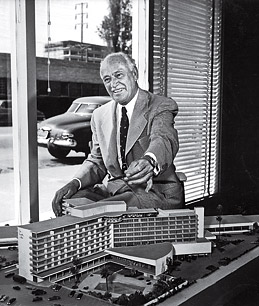
Conrad Hilton really wanted to be a banker. Instead, he parlayed the serendipitous purchase of a Texas fleabag into a multimillion-dollar hotel empire that earned him the moniker "innkeeper to the world."
Born in New Mexico in 1887, Hilton was 19 when his parents began renting out rooms in their home. The business didn't interest him, however, so he became a state legislator, founded a bank and went off to war. In 1919, after Hilton's father died, a friend suggested he go to Texas to make his fortune. Hilton ended up in Cisco; when his bank deal there soured, he headed to a nearby hotel. The Mobley catered to oil-field workers, so its 40 rooms turned over every eight hours. A week later, Hilton owned it. He soon acquired more hotels — and started to build new ones. His first, the Dallas Hilton, opened in 1925. By the late 1940s, Hilton's portfolio included the Town House in Beverly Hills and Chicago's Palmer House, as well as swank nightclubs featuring A-list stars. He also expanded internationally. And in 1949, he bought the "greatest of them all": New York City's palatial Waldorf-Astoria. Quintessentially American, Hiltons were innovative too: the first to have rooms with air-conditioning, TVs, ironing boards and sewing kits. Even modern hotel-reservations systems evolved from one Hilton debuted in 1948.
Today the Hilton Hotels Corp. encompasses some 3,300 properties in 78 countries. Last year more than a quarter-billion guests checked in.